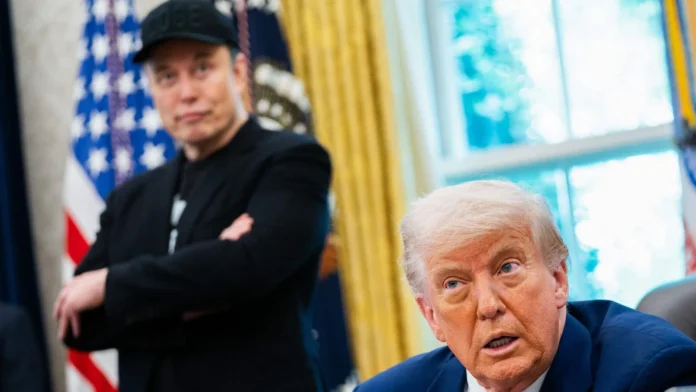The Trump-Musk fallout has exploded into a full-scale feud, shifting the dynamic between two of America’s most influential figures—former President Donald Trump and Tesla CEO Elon Musk. Once seen as unlikely allies, their relationship has taken a nosedive in 2025 following public disagreements and escalating personal jabs. As the drama unfolds, its effects are already rippling through political circles and the financial world, particularly impacting Tesla stock and conservative voter sentiment.
How the Trump-Musk Fallout Began
The rift between Trump and Musk began with what appeared to be minor political differences. However, it took a serious turn when Musk claimed that Trump “would have lost the 2024 election without [his] help.” The comment didn’t sit well with the former president, who responded with a string of posts criticizing Musk’s arrogance and loyalty.
What was once mutual admiration—Musk donating significant amounts to Trump-aligned PACs and Trump praising Musk’s innovation—has now turned into open hostility. Trump’s campaign team has distanced itself from Musk, while Musk has made it clear he will no longer offer political or financial support to Trump or his affiliates.
Impact on Tesla Stock and Public Image
The Trump-Musk fallout has not only strained political alliances—it has hit Musk where it hurts most: Wall Street.
After the feud became public:
- Tesla stock price dropped 4.7% in two days amid investor concern.
- Political boycotts from conservative groups who back Trump began trending online.
- Musk’s image among Republican voters declined sharply, especially in rural and southern states.
This feud adds to Tesla’s recent volatility, and many analysts now consider the brand’s perceived political alignment a liability. Musk has long walked a fine line between innovator and provocateur, but this public spat with Trump might mark a tipping point.
Key Moments in the Feud
To better understand the rapid unraveling of their relationship, here are some key events:
| Date | Event |
|---|---|
| March 2024 | Musk contributes over $100M to Trump Super PAC |
| November 2024 | Trump wins reelection; Musk praised as a “visionary genius” |
| April 2025 | Musk publicly criticizes Trump’s spending plan |
| May 2025 | Trump accuses Musk of “acting like a liberal tech bro” |
| June 2025 | Musk withdraws support, says Trump’s ego is “out of control” |
These developments have led to an erosion of trust between Trump’s base and the tech mogul. With elections approaching again, the question is whether Musk’s political influence has permanently diminished—or if he’s just changing lanes.
Republican Rift: Who’s Taking Sides?
The Trump-Musk fallout has forced a political reckoning within the GOP. Several lawmakers and influencers are picking sides:
- Pro-Trump Republicans like Matt Gaetz and Marjorie Taylor Greene have doubled down, calling Musk “an opportunist.”
- Others, such as Senators Rand Paul and J.D. Vance, are urging caution, saying alienating influential entrepreneurs like Musk could hurt the party’s innovation agenda.
- Meanwhile, some centrist Republicans quietly hope Musk might throw his weight behind a younger 2028 candidate.
Musk’s massive reach—especially among younger conservatives and libertarians—means the GOP risks losing a key demographic if the fallout deepens.
What’s Next for Musk and Trump?
While reconciliation isn’t completely off the table, it seems unlikely anytime soon. Trump’s camp is reportedly vetting new tech allies, while Musk is exploring alternative political movements and could even back third-party candidates in the future.
Musk has also hinted at launching a new political platform focused on tech-forward governance, decentralization, and fiscal responsibility—clearly at odds with Trump’s big-government populism.
For now, though, the fallout has exposed the fragility of transactional political alliances and served as a reminder: in the world of power and influence, loyalty is always negotiable.
Final Thoughts: Fallout With Real Consequences
The Trump-Musk fallout isn’t just a celebrity spat—it’s a pivotal moment in American politics and business. It’s altering power dynamics, shaking investor confidence, and redefining who controls influence in the Republican party. With both men commanding passionate followers, this rift is far from over—and its consequences could echo through the 2026 midterms and beyond.
Want more political analysis and real-time updates on influential power plays? Subscribe now and stay ahead of the headlines.
